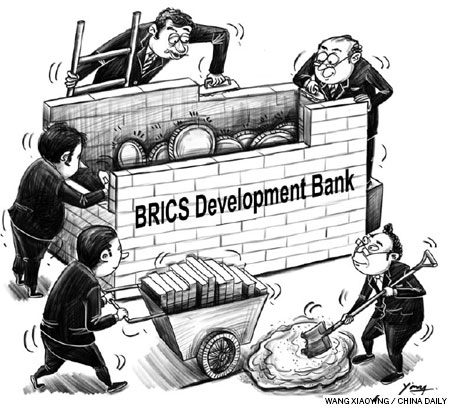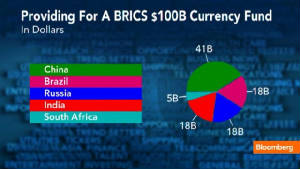
Move Over IMF for the BRICS Development Bank
James Hall

The International Monetary Fund is an extortion financier’s outfit for a gang of exploiter banksters. The colonists of global mercantilism operate on extending credit with strings attached and assets targeted for attachment. Poor and underdeveloped economies beg for roll over extensions of old debt in an endless circle of currency debasement and resource transfer. So why anyone would get excited over a competing banking house, seems to escape implications within the news publications.
"The bank is intended to fund development and infrastructure projects in BRICS nations and elsewhere. First discussed a year ago, it has been described as an alternative to the IMF and World Bank for developing countries.
Although the plan is the biggest announcement to come out of a summit of BRICS leaders in Durban, South Africa, where they signed an accord today, details such as how much capital the bank will have, its structure and its location have yet to be worked out."

Would this development bank become simply a Chinese dynasty investment structure based upon the weight of their financial leverage within the system? Or would the union of eager modernizing countries really be the future formula for economic growth and wealth? On the surface the positive foreign reserves and lower indebtedness seem to answer a resounding yes, but look a little deeper.
"The planned development bank "is feasible and viable," leaders confirmed in a statement on Wednesday. Such a bank would "supplement the existing efforts of multilateral and regional financial institutions for global growth and development."
However, officials speaking earlier during the summit admitted that various key details remain to be worked out before the proposed bank can become fully operational - a process that is expected to take years. For instance, disagreements have already surfaced among the BRICS on the specifics of the bank's mandate, and how exactly the institution would be financed."
The question, missing from the depths and significance of news analysis is whether a competing fund for international lending from a group of rival countries will improve on the sorry record of Western banking.
"Analysts who attend the BRICS deliberations point out: "By day they talk grandly of multilateral action to tip the playing field in favour of poorer nations, while by night they scheme shamelessly against each other, often in conjunction with their supposed economic oppressors in the West." There is, he adds, virtually nothing that unites them other than resentment and suspicion of Western monopoly - not all of which is justified."
"All the Brics are slowing sharply. China's economy has slowed from an average annual growth rate of 11% in the last decade to less than 8% in 2012. That has taken the wind out of economies that set sailBSE 0.56 % by selling raw materials to China, particularly Brazil and Russia, where GDP growth slipped to 1% and 3.5%, respectively, last year. Investors are heading for other destinations, and in dollar terms the Brics stock markets are trading 30-40 % below the peaks of the last decade. But, once again, the politicians are a step behind.
The Brics no longer look like a rising economic axis. On average, the growth rate of Brazil, Russia and South Africa is likely to be around 2.5% over the next few years, about the same pace as the US. That would be a terrible disappointment for these developing nations eager to catch up to the West, as their per capita income is much lower than that of the US. Owing in good part to the Brics slowdown, the US economy is now growing at the same pace as the global average for the first time since 2003, leading to stabilisation in its share in the world economy at around the long-term average of 23%."
These foreign press items reflect a much different understanding from the news report on the BRICS announcement video, 'Hegemonic corporations scared as BRICS plan bank to rival IMF'.
An optimistic projection that the global economy will generate sensible growth and prosperity because of BRICS leadership, is a stretch at best. This concern is certainly no endorsement of the existing Western debt created money-banking model. However, the power of the IMF and World Bank is based upon the military enforcement arm of the NATO machine.
The concept of central banking is immutably defined by the dominance of empire. The peaceful relinquishment of international finance to the BRICS is about as probable as a soft landing from the world debt bubble.
Evolving is a testing of world markets for a transfer to a different banking center colossus. In order for that hypothesis to be even remotely possible, the world reserved currency status of the U.S. Dollar must be replaced with a basket of other currencies.
The BRICS countries have their own set of internal economic shortcomings. Much of their cash flow is export trade related. The collapse of global trade is the biggest risk that looms over a brighter future for especially undeveloped economies. Another quasi-IMF stratagem that presents a top down banking compliance is not an alternative to the existing fraud.
Looking for altruistic benefactors that are willing to finance capital requirements, from usury lenders is a fools dream. Setting off a turf war, results in collateral damage, for everyone. Financial conflict is predictable when business is based upon a destructive banking version for an imbalance in commerce obligations. A butting of heads between the BRICS, the EU and the USA is just as inevitable.
James Hall – April 3, 2013
VIEW VIDEO AND LISTEN TO AUDIO
http://www.batr.org/negotium/040313.html
